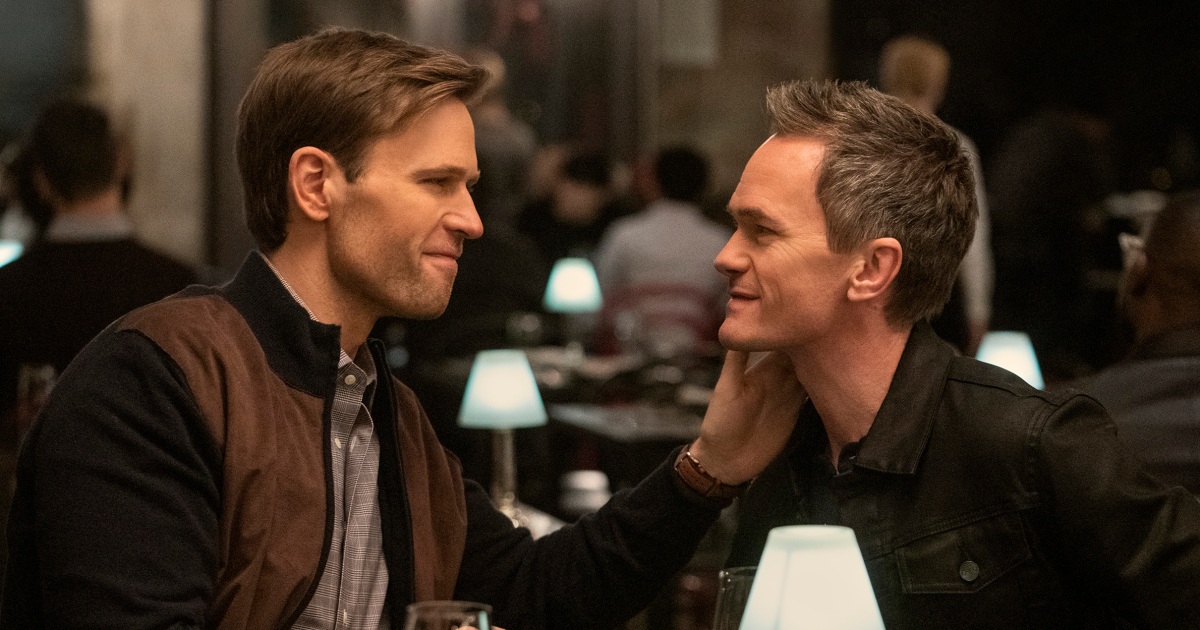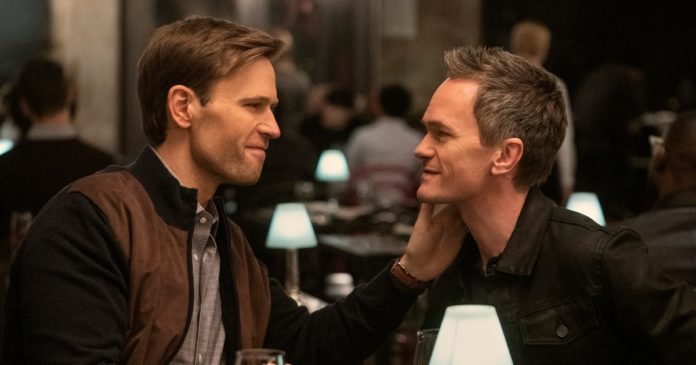
More than eight years after completing his run as the legendary straight cad Barney Stinson on CBS’ “How I Met Your Mother,” Emmy-winning actor Neil Patrick Harris has returned to the sitcom format in Netflix’s “Uncoupled,” playing a gay man who is unwillingly thrust back into the New York City dating scene after being unceremoniously dumped by his partner of 17 years.
Created by Darren Star (“Sex and the City”) and Jeffrey Richman (“Frasier,” “Modern Family”), “Uncoupled” — which premieres Friday — follows Michael Lawson (Harris), a successful New York City realtor whose perfect life is thrown into disarray when his longtime partner, Colin (Tuc Watkins), unexpectedly moves out on the eve of his 50th birthday. Overnight, Michael has to contend with two nightmares: losing the man he thought was his soulmate and being forced to navigate the digital and generational gap of dating as a newly single gay man in his mid-40s.
Harris — who rose to fame as a wunderkind doctor on “Doogie Howser, M.D.” but has received critical acclaim for his dramatic roles in “Gone Girl,” “It’s a Sin” and “A Series of Unfortunate Events” — has always been open to tackling projects that vary in genre and scope. Last summer, he received a text message from his agent asking him to read a romantic comedy pilot script that Star and Richman had initially written without a particular actor in mind.
“Once we finished the pilot, we knew that Neil Patrick Harris was the only actor we wanted,” Richman wrote in an email. “He challenged us in a very positive way by asking really smart questions about [the] character and story that we had to come up with answers to. It only made the writing better.”
Having admired Star’s expansive body of work and worked with Richman on the short-lived NBC sitcom “Stark Raving Mad” at the turn of the century, Harris jumped at the chance to team up with the veteran TV writers on a modern-day show that would be filming in New York, where he lives with his husband, David Burtka, and their two young children.
The script he read “was contemporary and casual and fun, and yet kind of made me tear up,” Harris told NBC News in a recent video interview. For the 49-year-old actor, who is in “a super long-term relationship” with Burtka, the show’s immediate appeal, apart from the creators, lied in the opportunity to explore an alternate version of his own life: “It is almost a ‘what if my life took a radical turn?’ story,” he mused.
As he grapples with the grief and denial of being “uncoupled,” Harris’ character, Michael, struggles with the politics of gay dating in today’s society — the transactional nature of hookups, the unwritten rules of etiquette on various apps.
The jarring experience of being thrown into “a whole other world” and forced to learn on one’s feet was something that the creative team really wanted to convey, according to Harris, who likened Michael’s struggles with adapting to the ever-changing dating world to his own struggles with the evolution of texting.
“When you’re dating people who are decidedly younger than you, who have been doing it this way for a long time, it’s a learning curve, and I think learning curve comedy is always fairly universal,” he said.
Having begun his courtship with Burtka in 2004, long before the prevalence of dating apps, Harris quipped that he is equal parts “impressed” and “horrified” by the contemporary concerns of courting, adding that he feels lucky that he “got to date before all of the distractions” that have caused shorter attention spans.
“I find it very sexy and titillating that very specific kinks and desires can be overtly traded and discussed and matched up,” Harris said. “Oftentimes, back when you just went on a date with someone, it was very uncomfortable to reveal what turns you on, and that was not a first or second date conversation. That was like, ‘We’ve really got to know each other, and now we’re going to sort of talk about, ‘Oh, I’d rather you didn’t do that,’ or ‘I really like it when this happens.’ But now that’s all it is, right? … That’s exciting.”
But, he added, “I also feel like we’re karmic people; you’re going to meet the right person when the timing is right. If you’re too hard core trying to find it, you’re not going to find it. But people match up when they’re supposed to, the way they’re supposed to. Life works well that way.”
While Michael frets over the viability of a middle-aged gay man in a dating market mainly comprised of younger men, Harris said he has grown to embrace aging over time, despite living in a culture and working in an industry that continues to value youthful appearances.
“I think aging is a very personal thing that probably has to do with how you were raised, what your parents thought, what your friends think,” said Harris, who “always sort of felt younger” than he was as a prominent child actor known for his boyish good looks.
“My decadeslong struggle was to just feel comfortable in my own body, because I would be in my mid-20s, my late 20s, and I just still would go to the gym and feel like I was a sophomore in high school and everyone was better than me at it, and I felt awkward and gawky and didn’t know my posture,” he said. “But now that I’m almost 50, I feel healthier and in better shape and quite frankly more comfortable in my skin than before. I feel like that’s kind of a life goal — an achievable life goal is to want to take your shirt off more when you get older, because it doesn’t mean as much to you.”
Part of becoming more comfortable in his own skin came when Harris decided to publicly come out in 2006, in a statement to People. More than 15 years later, the actor thinks “we’re entering this new world” where the strides in onscreen LGBTQ representation mean “there’s less fear of negative repercussions for being proud and open and honest about who you want to make out with” — to the point that he is now able to lead his own Netflix show as, and about, an openly gay man.
“Certainly now, more than ever, people are encouraged to be honest with everyone about who they are, and that takes down different guises to different people,” he said. “But I can certainly speak to the fact that once I was openly out and still working … I was less concerned about maybe ‘tells’ or people thinking things about me because I was just who I was, and I think there’s innate freedom and breath and just posture with just existing.”
But Harris cautioned that, at the end of the day, actors are supposed to act, explaining that he chooses to look beyond the labels of gay or straight when breaking down his own characters.
“Straight people are all very different, and gay people are all very different. There’s a lot of effeminate affectations that can come into play, there’s a lot of masculine affectations that can come into play, regardless of sexuality,” he said.
“I was playing a straight guy in ‘Gone Girl,’ but I didn’t butch it up really, because the character that I was playing was kind of weirdly awkward and a little creepy, androgynous psycho [like] Norman Bates … so I didn’t need to be a straight guy in order to play him. I just played him singularly,” he continued. “And if I was playing an over-the-top flight attendant on a broad comedy, then I’d probably swing into a very different interpretation — not of gay versus straight, but of what the writers and the directors were hoping for.”
Harris said he believes an actor’s sexuality is very different from how they choose to play their characters.
“You just want to have as many actor arrows in your quiver,” he said with a smile. “I want to be able to be a baller in a Guy Ritchie heist movie with an accent and everything and be a bare-knuckle fighter … but I also want to be camp and living my best life on a dance floor. So I want to be able to have the opportunity to do both of those, but they’re very different skill sets — and that’s kind of what my job is.”
“Uncoupled” is now streaming on Netflix.








